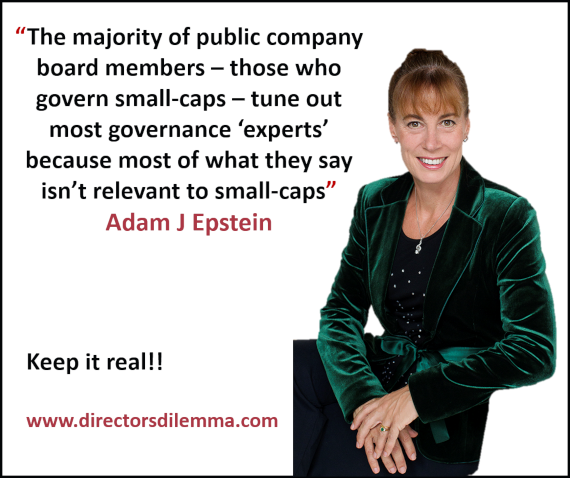|
|
|
|
|
|
|
|
|
Dear reader,
Welcome to the March 2019 edition of The Director’s Dilemma.
I write these dilemmas based on real events that have occurred during my twenty years’ experience serving on and consulting to boards. The reputation damage and career impacts of a board gone awry can be severe. I work with boards to help them succeed and avoid becoming front page news, banned or fined. I do this by diagnosing board processes and procedures to identify latent problems, and guiding clients to address threats before they eventuate.
To read this email in a browser, go to www.mclellan.com.au/newsletter.html and click on 'read the latest issue'.
This month our case study protagonist faces an unforeseen dilemma that will require policy to be made in response to a situation that has appeared out of the blue. These are the ‘interesting’ things that sometimes happen to test our ability to think ethically and decide on a course of action that maximises the outcomes for all concerned I hope you enjoy thinking about the governance and strategic implications of the latest dilemma:
 Ica is the external independent chair on a domestic subsidiary board of a multi-national company. It is a pleasant, collegiate board and includes the national MD, who resides in-country, and the international business development manager and the MD’s line manager, who are both based overseas. Ica is the external independent chair on a domestic subsidiary board of a multi-national company. It is a pleasant, collegiate board and includes the national MD, who resides in-country, and the international business development manager and the MD’s line manager, who are both based overseas.
Recently one of the senior executives, who does not have a board seat but reports to the board, asked for a meeting with Ica. She made time to meet him as soon as she could. At the meeting the executive informed Ica that he had got into financial difficulties following the failure of some private investments for which he had borrowed capital. He was about to file for bankruptcy and wanted to know how this would impact his job.
Ica wasn’t sure. There did not seem to be any policy which set out what the company should do under these circumstances. She knows that the MD likes and values this team member. She feels the same, and has assured him that the company will do what it can to support him through this difficult time. She recommended that he talk with his MD and with HR.
Now Ica is wondering how her desire to help this employee can be turned into a policy to give guidance and support to all staff. What issues should she consider and address?
|
|
|
|
Albert's Answer

Where lies Ica’s dilemma? Is it a moral dilemma or is it a legal dilemma?
As an external independent chair of a subsidiary of a multi-national company, Ica can argue that it is not her problem at all. She could say, wrong address, go to your line manager; probably the MD of the subsidiary. This is also what she recommends AFTER an interview with the executive.
So probably Ica feels it as a moral dilemma, because there is no policy and it is a successful executive. If there is a known policy (thus created at HQ, known to the whole group of companies) one does not have a moral dilemma, but a known corporate governance policy; comply or explain.
Bankruptcy can be read differently in different cultures. In the USA, is getting back on your feet after a bankruptcy perhaps a plus for the executive. In Europe the bankruptcy could be seen as to have taken too many risks, which might be a sign of irresponsibility, so a minus for the executive. A global policy will therefore be very difficult. Besides it is private matter. A cultural dilemma too.
If the executive will be fired because of this, without a policy from the company, I think he would have a solid case before court. Ica should investigate these risks.
Albert Froom LLM is Managing Partner at Leaders Trust in The Netherlands, a Founding member and member of the board practice of AltoPartners Netherlands. He is based in Utrecht, The Netherlands.
|
|
|
|
Julie's Answer

No board can plan and have policy in place ready for every situation that may occur!
A collegiate and respectful board that supports the executive team is well positioned to make difficult ethical decisions, considering all the facts, and respond to events as they emerge.
First the board need to consider the legal background to the issue. Ica owes her duty to the company; not the executive concerned. She needs to consider both the role and the performance and potential of the executive to ensure that she acts to improve the long-term value of the business, rather than from any feelings of friendship. Next, she should consider legal constraints to helping the executive. Does this executive fulfil any functions that have a statutory obligation of solvency? Fortunately for Ica this executive does not have a board seat; directorships cannot be held by anyone who is an undischarged bankrupt. If there is no statutory restraint on the executive remaining in his position, Ica needs to then consider the nature of the position and any practical considerations such as the inadvisability of having the executive handling cash, etc.
If Ica can verify that there are no factors that would cause the executive to be ineffective in his role she, and her board, need only to note the bankruptcy and resolve that there is no impediment to continuing the employment relationship. If the role needs to be changed to better manage the risks, the board should resolve that and delegate implementation through the CEO.
Next Ica needs to ensure that her HR professionals are up to speed on any administrative matters, such as garnishee orders, that will need implementing.
Finally, the board should consider the need to treat the matter with tact and sensitivity. This is a ‘need to know’ issue best kept among a small group.
Julie Garland McLellan is a non-executive director and board consultant based in Sydney, Australia.
|
|
|
|
Jason's Answer

A senior executive, or any staff member, filing for bankruptcy is unlikely to be something an employer will face regularly; in excess of 30,000 Australians are declared bankrupt each year, so it is a scenario that you could come across.
Some matters Ica may wish to consider are:
-
Privacy - Generally people don’t want the world to know of their financial problems, so keep the news quiet and seek permission from the affected staff member before talking to others (eg. HR).
-
Emotional support - Rarely does anybody set out to go bankrupt, so obviously it is going to be a stressful time for the staff member. Supporting the executive while they make a decision on which insolvency option to take (bankruptcy is not always the only option), and during the insolvency process itself is needed. The firm’s Employee Assistance Program may include free access to a psychologist and/or insolvency practitioner which could be useful in this situation. But just popping around and asking the employee ‘are you okay’ now and then could be all that is needed. Bankruptcy could lead to the sale of the employee’s house, which could take months or even years, so support may be required over an extended period.
-
Financial support - Depending upon the quantum of the debts owed the firm may be prepared to pay the creditors so that the staff member avoids bankruptcy on the basis of repayment by way of salary deductions. This may be of more interest where the company is affected because of the industry it works in. eg. there may be negative impacts on an accounting firm if a staff member is declared bankrupt, so it is in the interests of the firm to provide some financial assistance.
-
Industry obligations - There are various industries whose licences are affected by an insolvency administration, thereby impacting on a firm’s ability to earn income. Very quickly the employer needs to assess its obligations to report the insolvency to industry and regulatory bodies, and where necessary manage changes to ensure continued compliance.
-
Contact from the insolvency administrator - There is generally no obligation on an Australian bankruptcy trustee to inform an employer of their employee being declared bankrupt. However, in some circumstances the insolvency administrator may make contact with the employer. For example, all bankrupts are required to pay half of their income above a statutory threshold to the estate, and if the bankrupt fails to do so the bankruptcy trustee may garnish their wages.
Have a system in place to deal with correspondence, ensuring you seek external advice (eg. legal) where needed and respond in the appropriate timeframe. Be mindful that not all correspondence from the bankruptcy trustee to the employer should be brought to the employee’s attention.
There are of course a myriad of different industries and staff roles so the list of issues to consider are endless. Hopefully the above can be used as a basis to assist in developing an appropriate strategy to deal with a staff member who is facing insolvency.
Jason Bettles is an Owner at Worrells Solvency and Forensic Accountants, a Registered Liquidator, Registered Bankruptcy Trustee, Chartered Accountant and a member of the Australian Restructuring Insolvency & Turnaround Association. He is based on the Gold Coast, Queensland, Australia.
|
|
|
|
Book review - Boards that Lead by Ram Charan, Dennis Carey and Michael Useem

This is a great book for experienced directors. It investigates the areas where judgement is required to determine whether to accept the status quo or whether and how to intervene.
The book makes use of real-life case studies and considers those difficult decisions around how to address over or under contribution by the board or a director, when to revise the strategy and when to press for better implementation, etc.
It is written in an authoritative tone by three experts from major institutions (two academic and one corporate) who have all had privileged access to boards across a range of industries and at different points on the companies’ life cycles.
CEO succession and oversight is a recurring theme and underpins much of the practice recommendations made. Director performance management is another thread that is prominent in the stories woven throughout the book.
This book has assisted me with courage and ideas for addressing difficult situations on my own boards and those where I consult. It is replete with practical solutions.
Available at Amazon.
Julie's News - In February

The Hayne Financial Services Royal Commission delivered its final report to the Governor General on 1 February. It was tabled in Parliament three days later and Australia has been talking about it ever since. I was interviewed on ABC News ‘The Business’ about the need for directors to ask questions that lead them to understand what is (really) going on and then to make appropriate decisions. The recommendations in the report were reminders of director’s duties, rather than anything new. Here is an easy to navigate online version of the Final Report.
The prospect of seeing more ‘high flying’ directors facing prosecution has focused attention on how boards can achieve effective monitoring and setting of corporate culture. This has long been an area where boards struggle to achieve an appropriate balance between independence and insight; directors need both!
My back (which I hurt in January) was sufficiently recovered for me to attend the Wharton Business School Boards That Lead course where Ram Charan, Dennis Carey and Michael Useem reinforced that people and culture are more important than strategy because they set the strategy. I returned with some great ideas to invigorate my governance and strategy workshops. And, as it was Philadelphia, the obligatory photo standing in Rocky’s footsteps on the Art Museum Steps.
The course also spent time on the key areas where board performance impacts corporate performance and how to conduct a board review that really will add value. I am busy incorporating this into my reviews in progress as well as preparing a whole new review process that will drive better engagement and, hence, better performance.
I conducted a few strategy workshops for boards and their executive teams during the month and was happy to be kept busy and productive all through the month.
I am always keen to work more and will be delighted to hear from you if you would like to arrange a board strategy workshop, education session, or board performance review. Just call me on +61 411 262 470 or reply to this email for a discussion of how I might help your board.
Inspirational quote for March - This month my favourite quote is:

A note on names - A few readers have asked me where I find the names for the protagonists in each case study; I ‘borrow’ them from people I meet or things that I read. Ica is a Greek name and means ‘light’. Our protagonist will need to quickly shed some light on an area of legal and moral complexity to help her board reach a decision that safeguards both the performance of the organisation and the mental health of the employee concerned.
This newsletter - If you have any ideas for improving the newsletter please let me know. If you are reading a forwarded copy please visit my website and sign up for your own subscription.
Suggestions for dilemmas - Thank you to all the readers who have suggested dilemmas. They are greatly appreciated. I will answer them all eventually. I could not write this newsletter without your help and without the generous help of all the experts who respond each month to the case studies.
Be a contributor - If you would like to attempt a response to the dilemmas for publication you will be most welcome. Simply reply to this email and let me know.
Let's connect - I use LinkedIn to share information about boards and directorship with my friends and acquaintances. If you use LinkedIn and we are not yet connected I will welcome a connection from you. You can find me at linkedin.com/in/juliegarlandmclellan.
Let me help you - I would be delighted to speak for or train your board, staff, audience and/or group. If I can help please contact me at julie@mclellan.com.au.
Farewell until the next issue (due 1 April 2019). I look forward to greeting you again then. In the interim I hope you will enjoy health, happiness and hard work.
Enjoy governing your corporations; we are privileged to do what we do!
Best regards,
Julie
Photo Credits: Personal images in this newsletter are provided courtesy of the contributors, course attendees and conference participants.
Main Photo by courtesy of Shutterstock.com.
Disclaimer:
The opinions expressed above are general in nature and are designed to help you to develop your judgement as a director. They are not a definitive legal ruling and do not constitute legal advice. Names and some circumstances in the case study have been changed to ensure anonymity. Contributors to this newsletter comment in the context of their own jurisdiction; readers should check their local laws and regulations as they may be very different.
Privacy:
I am privileged to have your contact details and keep them as safely as possible. I will alert you if they are ever accessed by any unauthorised person (the technical staff at ayuda help with publishing and issuing the Director's Dilemma nad have access so they can send the newsletters to you). I do not sell your details to anyone; they are kept only for the intended purpose - sending you this newsletter and helping to build the judgement of company directors by providing a safe way to consider potential responses to real life events.
|
|
|
|
|
|
|
|
|
|
|
|
|
 Ica is the external independent chair on a domestic subsidiary board of a multi-national company. It is a pleasant, collegiate board and includes the national MD, who resides in-country, and the international business development manager and the MD’s line manager, who are both based overseas.
Ica is the external independent chair on a domestic subsidiary board of a multi-national company. It is a pleasant, collegiate board and includes the national MD, who resides in-country, and the international business development manager and the MD’s line manager, who are both based overseas.






